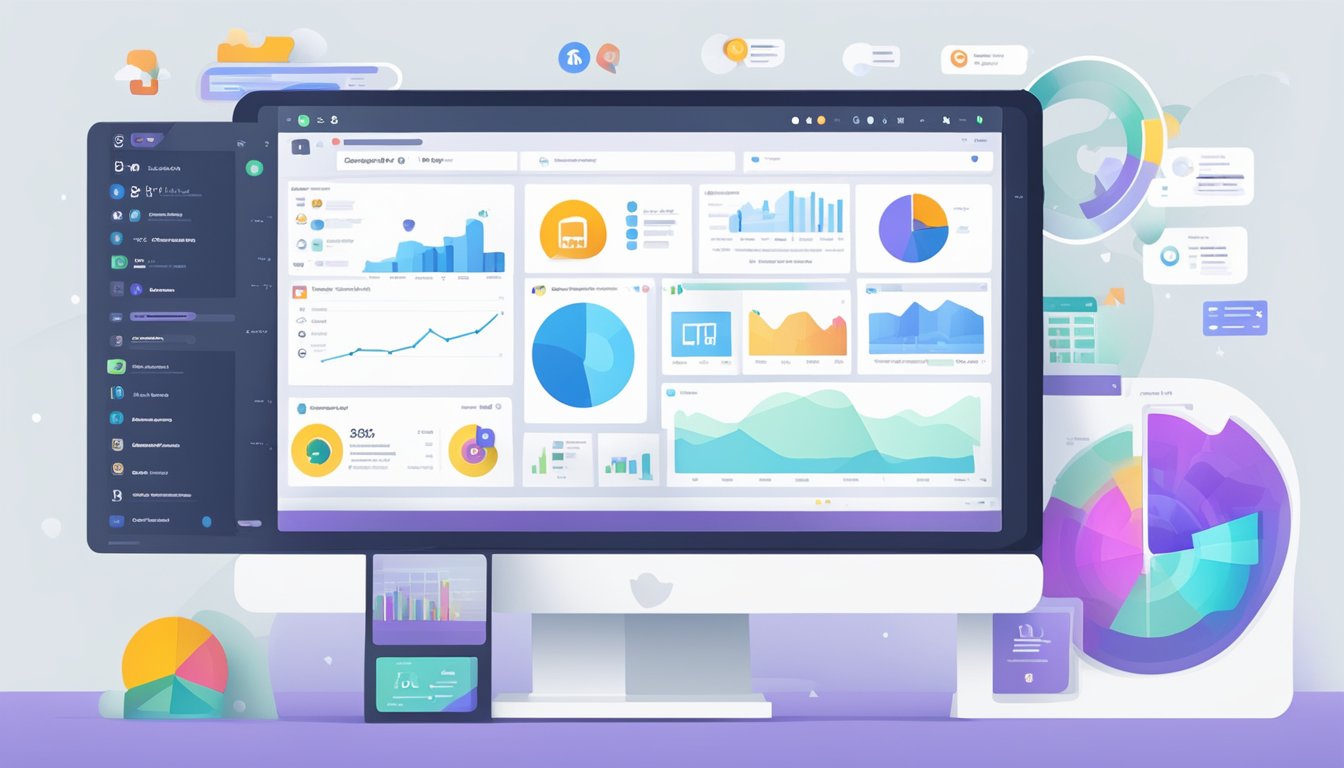Social media management software has become an indispensable tool for businesses and individuals alike to streamline their online presence. With the growth of digital platforms, managing multiple accounts efficiently is critical for maintaining a strong brand image and engaging effectively with audiences. These tools not only offer the convenience of scheduling posts across various networks from a single dashboard but also provide valuable insights into user engagement and content performance.

Users of social media management software range from small business owners to large corporations, social media managers, and marketing agencies. They rely on these programs to curate content, monitor conversations, manage community interactions, and measure the impact of their social media campaigns. The ability to analyze social trends and track competitor activity positions users of management tools to make informed decisions, thereby improving their strategic approach to social media marketing.
Investment in social media management software is driven by the need for efficiency and effectiveness in the digital space. Users benefit from features like automated publishing, detailed analytics, and customer relationship management, which saves time and resources. As social media continues to evolve, these tools adapt to offer advanced functionalities that meet the changing demands of the virtual landscape, ensuring users stay ahead in a competitive market.
Overview of Social Media Management Software

Social media management software streamlines and consolidates the way they interact with social media platforms. It allows for effective tracking, posting, and engagement across multiple accounts from a centralized hub.
Key Features
- Multi-Account Integration: Users can link and manage numerous social media profiles from various networks.
- Scheduling: Enables posts to be planned in advance for consistent content delivery.
- Analytics: Offers tools to analyze performance metrics such as engagement rates and follower growth.
- Engagement: Provides a unified inbox to monitor and respond to messages/comments.
Core Benefits
- Efficiency: Saves time by centralizing social media tasks.
- Consistency: Helps maintain a regular posting schedule across platforms.
- Insight: Aids in understanding audience behavior and improving strategy through analytics.
Common Misconceptions
- Auto-Pilot: Some believe these tools manage everything automatically, but human oversight is necessary.
- Complexity: It’s often thought to be overly complicated, yet many platforms are user-friendly with intuitive interfaces.
Selecting the Right Software

When it comes to picking social media management software, it’s crucial to consider specific business needs, scalability, and how well it integrates with existing tools.
Assessment of Business Needs
Businesses must clearly identify their objectives and the features required to achieve them. For instance, a company focusing on customer engagement will prioritize analytics and interaction capabilities, while a content-heavy brand may need robust scheduling and publishing features.
Software Scalability
The chosen software should accommodate growth without significant overhauls. This means looking for platforms that offer advanced features and user access levels as the business expands. Economies of scale should be considered, ensuring the cost per additional user or feature does not become prohibitive.
Integration Capabilities
Seamless interaction with existing software ecosystems is non-negotiable. The ideal management tool integrates smoothly with CRM systems, analytics tools, and other marketing platforms. Such integration ensures streamlined workflows and a single source of truth for data-driven decision-making.
Setting Up the Software

Proper setup of social media management software is crucial for efficient operation and security. It involves creating accounts, tweaking features to suit business needs, and configuring security settings to protect sensitive information.
Account Creation
To start using the software, one must create an account. This typically involves:
- Filling out a registration form: The form usually asks for details such as name, email, and company information.
- Verifying the email address: A verification email is sent to ensure the email provided is valid.
Customization Options
Once the account is created, customization can begin. Users have several options to tailor the experience:
- Branding: Incorporating logos, brand colors, and themes.
- Workflow: Setting up the approval processes and team roles.
Security Settings
Security is a pivotal concern. Users are advised to:
- Enable two-factor authentication (2FA): This adds an extra layer of security to account logins.
- Manage permissions: Restricting access to features based on user roles to minimize security risks.
Daily Operations

Effective social media management relies heavily on the seamless execution of daily tasks. These operations ensure that content is consistently delivered, audience engagement is maintained, and performance is meticulously tracked.
Content Scheduling
Social media management software streamlines the process of publishing content through advanced scheduling features. They can set specific times for posts to go live across various platforms, ensuring a steady stream of content without manual intervention. Here’s a quick view of the content scheduling capabilities:
- Calendar View: Visualize the entire content pipeline with an intuitive calendar.
- Bulk Uploads: Schedule multiple posts at once with CSV uploads or similar methods.
- Time-zone Adjustment: Automatically adjusts post times for different audience regions.
Engagement Tools
Staying engaged with the audience is paramount, and social media software provides a suite of tools to facilitate this. These tools aggregate messages, comments, and mentions so that they can respond promptly. Key engagement features include:
- Unified Inbox: One-stop area for all incoming social interactions.
- Automated Responses: Setup for common questions to improve efficiency.
- Real-time Alerts: Immediate notifications for important engagement opportunities.
Analytics and Reporting
The analysis of social media performance is enhanced through comprehensive reporting features, which deliver actionable insights. These analytics tools measure campaign effectiveness, inform strategy, and identify trends. Core analytics functions consist of:
- Custom Reports: Tailor reports to focus on key metrics.
- Engagement Analysis: Track likes, shares, and comments to gauge content success.
- Competitor Benchmarking: Compare performance against key competitors to strategize improvements.
Through these features, a social media management software user can maintain a robust and impactful online presence with ease.
Advanced Software Usage

Advanced software usage in social media management involves leveraging sophisticated tools to better understand and engage with audiences, maximize influencer partnerships, and take advantage of social commerce opportunities.
Sentiment Analysis
Sentiment analysis tools grant users the ability to gauge public perception by parsing social media comments, reactions, and mentions. Social Mention and Brandwatch are examples of platforms that offer deep sentiment insights, allowing businesses to quantify positive, negative, and neutral sentiments across their social channels.
Influencer Collaboration
Effective influencer collaboration is facilitated by software like AspireIQ or Upfluence, which provide users with searchable databases of potential influencer partners. They also offer analytics on influencers’ audiences, ensuring a brand’s marketing efforts align with their target demographics.
Social Commerce Features
Social commerce is increasingly pivotal, and software such as Shopify’s Shop feature or Facebook Shops enable businesses to sell directly through social platforms. These tools support product tagging in posts, shoppable stories, and in-app checkout, streamlining the consumer’s journey from discovery to purchase.
Troubleshooting and Support
Properly managing social media platforms requires a seamless experience with management software. Users will occasionally encounter issues, need to navigate software updates, and require support from the service team.

Common User Issues
Social media management software users might face a variety of issues such as difficulty scheduling posts, challenges with account integration, or errors in analytics reporting.
- Scheduling Posts: Users struggling with post scheduling should ensure they have the correct date, time, and timezone set.
- Account Integration: Failure to integrate accounts typically arises from incorrect credentials or outdated permissions which should be re-verified.
Software Updates and Maintenance
Keeping the software updated is crucial for optimal performance and security.
- Routine Updates: Enable automatic updates to ensure the software receives the latest features and bug fixes.
- Maintenance Windows: Be aware of scheduled maintenance times which may temporarily disrupt service.
Contacting Support
When issues persist, contacting the support team is advised.
- Help Center: Review the Help Center for guides and FAQs.
- Direct Contact: For unresolved issues, reach out through email, live chat, or phone support as provided by the software service.
Software Impact on ROI

In the landscape of digital marketing, social media management software provides tangible metrics that directly correlate to Return on Investment (ROI). These tools not only streamline operations but also deliver quantifiable data essential for evaluating marketing strategies.
Measuring Performance
Social media management platforms are equipped with analytics that track user engagement, reach, and conversion rates. They often present this data in dashboards that showcase key performance indicators (KPIs) such as:
- Likes and shares: Indicators of content popularity and audience engagement.
- Click-through rates (CTR): The percentage of users who click on a link out of the total users who view the post.
- Conversion rates: The percentage of users who take a desired action beyond a click, often measured through tracking pixels or UTM parameters.
This wealth of data enables businesses to see which campaigns are leading to sales, making it possible to calculate the ROI of specific social media initiatives.
Cost-Effectiveness Analysis
Using social media management software often leads to a reduction in costs related to:
- Time management: Streamlining content scheduling and publishing tasks.
- Personnel resources: Minimizing the personnel needed to manage social platforms.
- Advertising spend: Optimizing ads targeting to improve cost per acquisition (CPA).
The cost savings are measurable against the outcomes of social media efforts, thus influencing the ROI. Companies can weigh the expenses against the results in a structured format like the one below to assess the software’s impact on cost-effectiveness:
| Expense Type | Before Software Implementation | After Software Implementation |
|---|---|---|
| Time Spent (hours) | X hours | Y hours |
| Personnel Costs | $X | $Y |
| Advertising Spend | $X | $Y |
| Revenue Generated | $X | $Y |
The juxtaposition of before-and-after scenarios provides clear evidence of the software’s cost-efficiency benefits, reinforcing its value proposition in enhancing ROI.
Future of Social Media Management

In the realm of social media management software, one can expect significant developments driven by evolving technology and user demands. These advances are poised to transform how businesses interact with their audiences.
Emerging Trends
Artificial Intelligence Integration: The integration of AI into social media management tools is rapidly increasing. AI can automate content scheduling, suggest optimal posting times, and even generate basic content. Chatbots and AI-driven customer service tools are becoming integral for immediate interaction with users, providing round-the-clock support.
Influencer Collaboration Tools: Brands are recognizing the influence of social media personalities in driving customer engagement. Social media management platforms are likely to include more robust tools for identifying, managing, and tracking influencer collaborations.
Predictive Analytics Usage
Data-Driven Decisions: Predictive analytics are taking center stage as businesses strive for data-driven strategies. Social media management software will increasingly offer predictive insights, suggesting when to post content for maximum engagement and predicting future trends.
ROI Measurement: Tools will evolve to more accurately measure the return on investment (ROI) of social media campaigns. Detailed analytics will provide granular insights into user behavior, campaign performance, and customer journey mapping, aiding in efficient budget allocation.
